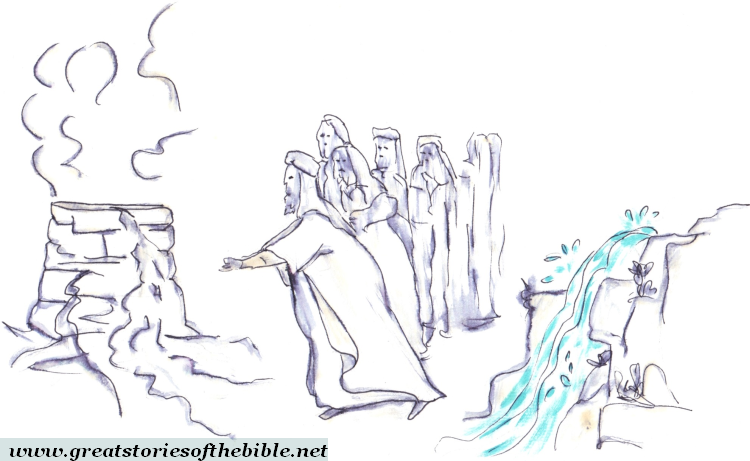Jeremiah - episode 2
They have forsaken me
We continue reading the Book of Jeremiah. We can divide it by theme into three main sections (with a historical appendix at chapter 52): oracles to the Lord’s people (chapters 1-25); the suffering of the prophet and of Baruch his collaborator (chapters 26-45); oracles to the foreign nations (chapters 46-51).
Here is the oracle which follows the story of Jeremiah’s vocation: «The word of the LORD came to me, saying, “Go, and cry in the ears of Jerusalem, saying, ‘Thus says the LORD, “I remember you, the devotion of your youth, the love of your weddings; how you went after me in the wilderness, in a land that was not sown. Israel was holiness to the LORD, the first fruits of his increase. All who devour him shall be held guilty. Evil shall come on them,”’ says the LORD.” Hear the word of the LORD, O house of Jacob, and all the families of the house of Israel! Thus says the LORD, “What unrighteousness have your fathers found in me, that they have gone far from me, and have walked after vanity, and are become vain? Neither did they say, ‘Where is the LORD who brought us up out of the land of Egypt, who led us through the wilderness, through a land of deserts and of pits, through a land of drought and of the shadow of death, through a land that none passed through, and where no man lived?’ I brought you into a plentiful land, to eat its fruit and its goodness; but when you entered, you defiled my land, and made my heritage an abomination» (Jer 2,1-7). The Lord asks Jeremiah to vigorously wake the people up from their deafness («cry in the ears of Jerusalem»), reminding them of the passionate moments of their spiritual birth (the Exodus). That Covenant was like the hot and mutual love of two spouses. The «fathers», however, are not those who passed to their offspring a strong faith in the Lord: on the contrary, they «walked after» rebellion and idolatry, described as «vanity» (more literally: “smoke”, “steam”). It is something that shows only apparent consistency and that, likewise, makes inconsistent («vain») who relies on it.
«The priests did not say, ‘Where is the LORD?’ And those who handle the law did not know me. The rulers also transgressed against me, and the prophets prophesied by Baal, and walked after things that do not profit. “Therefore I will yet contend with you,” says the LORD, “and I will contend with your children’s children. For pass over to the islands of Kittim, and see; and send to Kedar, and consider diligently; and see if there has been such a thing. Has a nation changed its gods, which really are no gods? But my people have changed their glory for that which does not profit. “Be astonished, you heavens, at this, and be horribly afraid. Be very desolate,” says the LORD. “For my people have committed two evils: they have forsaken me, the spring of living waters, and cut them out cisterns, broken cisterns, that can hold no water» (Jer 2,8-13).
In a depressing situation in which everybody abandoned the Lord, even His closest ones («priests», «those who handle the law», «rulers», «prophets»), He institutes a “rîb” against the people. This is a form of “controversy” or “extrajudicial lawsuit” that it was possible to use at the time to avoid a process or a war. The injured party invites the counterpart (they are linked by a law relationship: in the present case a Covenant) in front of witnesses (here we have «heavens») to desist from his/her evil behavior. If the offender accepts an agreement, the two sides reestablish their relationship; otherwise there are more drastic solutions, which can lead to a severe punishment (by the law court) or even to the destruction of one or both sides (war). Who institutes the “rîb” still loves the other side, he tries to reestablish the relationship between them without painful consequences for the offender. The main application of the “rîb” was in the family, where mutual relationships are full of intense affection and there are often disputes and claims: between husband and wife, between father and son, between brothers and so on. Although the people have so close to them a spring of fresh flowing water (the Lord), they prefer to build cisterns that can hold no water (the idols). The symbol of the source recalls once again the marital faithful intimacy between husband and wife (see Prov 5,15-20). On the contrary, idolatry is like prostitution: «“They say, ‘If a man puts away his wife, and she goes from him, and become another man’s, will he return to her again?’ Wouldn’t that land be greatly polluted? But you have played the prostitute with many lovers; yet return again to me,” says the LORD. “Lift up your eyes to the bare heights, and see! Where have you not been lain with? You have sat for them by the ways, as an Arabian in the wilderness. You have polluted the land with your prostitution and with your wickedness. Therefore the showers have been withheld, and there has been no latter rain; yet you have a prostitute’s forehead, you refused to be ashamed. Will you not from this time cry to me, ‘My Father, you are the guide of my youth?’ “‘Will he retain his anger forever? Will he keep it to the end?’ Behold, you have spoken and have done evil things, and have had your way.”» (Jer 3,1-5).
From Jeremiah’s severe indictment we can guess the great heart hardness of the Judah people; in the next post we will read about a formidable means of communication that he and other prophets used with particularly difficult counterparts: the symbolic actions.